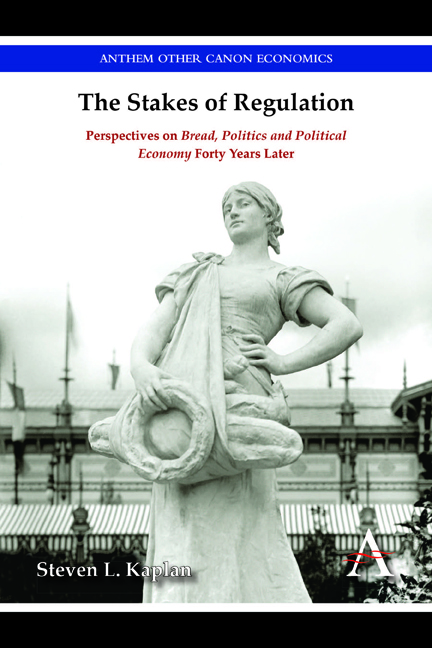Book contents
- Frontmatter
- Dedication
- Contents
- Introduction
- Chapter I (Re-)Thinking Regulation: Police, Prices, Markets
- Chapter II Agriculture and the French Economy of the Old Regime
- Chapter III Collective Action and Its Actors: The Moral Economy and the Market, the People and the Elites, Disorder and Order
- Chapter IV The Parlements in the Age of Economic Enlightenment
- Chapter V Kings and Ministers: Politics and Policies, Finance and Subsistence
- Chapter VI The New Historiography of Political Economy
- Chapter VII Famine, Dearth and Food (In-)Security
- Afterword
- Index
Introduction
Published online by Cambridge University Press: 20 July 2018
- Frontmatter
- Dedication
- Contents
- Introduction
- Chapter I (Re-)Thinking Regulation: Police, Prices, Markets
- Chapter II Agriculture and the French Economy of the Old Regime
- Chapter III Collective Action and Its Actors: The Moral Economy and the Market, the People and the Elites, Disorder and Order
- Chapter IV The Parlements in the Age of Economic Enlightenment
- Chapter V Kings and Ministers: Politics and Policies, Finance and Subsistence
- Chapter VI The New Historiography of Political Economy
- Chapter VII Famine, Dearth and Food (In-)Security
- Afterword
- Index
Summary
All politics starts with a grain of wheat.—Mirabeau
No bread, no politics.—Ange Goudard
I like reality, it has the taste of bread.—Jean Anouilh
I wrote Bread, Politics and Political Economy in the Reign of Louis XV as a doctoral dissertation at Yale. I had been studying the history of the American South with C. Vann Woodward, a wonderful teacher and splendid person whose deep social humanism and wise criticism I have never forgotten. My fascination with the South began at Princeton, a university deeply marked by its historical ties with the South. Princeton was still home to descendants of slaves manumitted by their student masters at graduation, some of whom worked in the eating clubs for which the university was (in-)famous. It also still attracted some of the South's best and brightest, as the formula put it, who were in search of an Ivy education in quasi-familiar terrain, a number of whom became my roommates and club mates. This was the more exotic component of a Brooklyn Jew's encounter with the wider Wasp world. If Princeton helped to incarnate a certain image of the South, my involvement in the civil rights movement had already drawn my interest to the southern experience. In retrospect, I suspect that my keen interest in the South, so deeply, emblematically and enigmatically an expression of America, had something to do with my own conflicted sense of needing or wanting to become more American, residue of a long-simmering feeling, not rare among the children of immigrants, especially early in their lives, that I did not belong.
I did not live this sentiment of unrootedness traumatically. On the contrary, it enhanced my curiosity for everything unfamiliar. I saw it as a sort of availability or receptivity. The burden of being an outsider had marked me indelibly, but I had begun to espy its advantages as well. I suspect that my French turn spoke to this quest to construct my “self.” Perhaps in order to anchor one identity, I needed to acquire another. Indeed, I had nourished a long-standing flirtation with things French, begun in undergraduate courses taught by Charles Gillispie, Ira Wade, Albert Sonnenfeld and David Bien, kindled at work in a wine factory at Ivry-sur-Seine for three months (1962), and subsequently fostered by a Fulbright year at Poitiers (1963–64).
- Type
- Chapter
- Information
- The Stakes of RegulationPerspectives on Bread, Politics and Political Economy Forty Years Later, pp. ix - xlPublisher: Anthem PressPrint publication year: 2015

